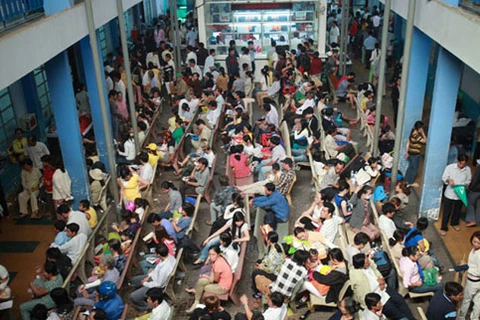 Hospital infection control and prevention is a major challenge facing Vietnam’s health sector. (Photo: VNA)
Hospital infection control and prevention is a major challenge facing Vietnam’s health sector. (Photo: VNA) Hanoi (VNA) - Hospital infection control and prevention is a major challenge facing Vietnam’s health sector despite its important role in providing successful treatment to patients, as many hospitals and health clinics do not pay enough attention to it, participants at a conference said last week.
At a conference on June 23 on infection control in healthcare facilities for the period of 2016-20, Deputy Minister of Health Nguyen Viet Tien said most hospitals and health clinics focus on investing in modern medical equipment, but fail to improve their infection control systems, which remain weak.
As a result, the recovery of patients has been affected. In some cases, their health was even worse than it was at the time of hospital admission, he said.
Luong Ngoc Khue, Director of the ministry’s Medical Examination and Treatment Management Department, said a measles outbreak in April 2014 killed more than 110 children and left thousands hospitalised nationwide.
He said the main reason was contraction among children when they were hospitalised. This was partly caused by poor infection control at hospitals and health clinics.
Hospital infections have become a burden for patients globally, especially in underdeveloped countries. It contributes to an increase in fatalities, treatment time, usage of antibiotics and cost of treatment.
A recent study by the ministry, which surveyed 9,340 patients, showed that hospital infections accounted for 5.8 percent of total cases. Half of those cases were patients who suffered from pneumonia.
Tien said infection control typically only touches on laundry, steaming and medical waste management instead of focusing on monitoring infection control practices and infection rates at hospitals and health clinics.
The infection control system at healthcare facilities remains incomplete, he said.
Figures from the ministry showed that about 20.8 percent of total hospitals nationwide failed to establish an infection control department, and 33 percent failed to assign a head of the department to implement infection control tasks.
Moreover, most health staff at the departments did not receive training, and departments also faced staff shortages. Many hospitals paid little attention to investing in infection control practices.
To improve the situation, health experts said the ministry has launched a national action plan to improve infection control at hospitals and health clinics in the next five years.
The infection control criteria would be applied in upcoming years. Targets and regulations on infection control would be specified to force hospitals and health clinics to comply.
The health sector would be expected to organise training courses for health staff on infection control and allocate funds for medical equipment to implement infection control practices, they said.-VNA
























